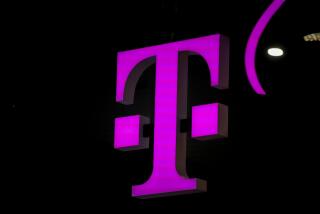19 Companies Pay $7 Billion in FCC Sale of Wireless Rights : Auction: As expected, the three-month competition was dominated by deep-pocketed phone industry giants.
- Share via
WASHINGTON — The Federal Communications Commission on Monday ended three months of high-stakes bidding in its landmark auction of the airwaves, with 19 companies offering a total of more than $7 billion for the right to provide the next generation in wireless phone service.
As expected, the competition was dominated by deep-pocketed telephone industry giants such as AT&T;, the regional Bell telephone companies and Wireless Co., a partnership made up of Sprint Corp. and cable TV giants Tele-Communications Inc., Cox Cable and Comsat.
FCC officials said the completion of the auction opens the door to rapid deployment of so-called personal communications services, which will provide voice, facsimile and even wireless video communications to most of the nation at costs lower than cellular phone service. The first PCS networks are expected to be up and running within three years.
“This is a true win-win situation,” said FCC Chairman Reed Hundt. “Before, we used to give (communications) licenses to the people with the best lawyers and lobbyists.” But this time, Hundt said, taxpayers will not only benefit from the money wagered, but also from the $14 billion to $21 billion in additional money winning bidders will spend to build their networks.
The auction ended one week after billionaire cellular phone executive Craig McCaw surprised the telecommunications industry by abruptly dropping out of the bidding after sharply driving up prices with his aggressive wagers. Some suggested that McCaw--who last year sold his cellular phone empire to AT&T--was; merely ensuring that AT&T;’s competitors would pay a steep price, but he professed sincere interest in re-entering the business.
The 99 licenses sold are treasured entry tickets for an industry that is expected to explode in coming years.
The Sprint partnership, the auction’s biggest spender, ponied up $2.1 billion in bids in 29 markets--including $442 million for one of New York City’s two licenses.
Pacific Bell, which desperately wanted to defend its home turf, paid nearly $500 million to wrest the Southern California license from McCaw and another $202 million to win one of the two Northern California licenses.
Some analysts said the high prices will make the PCS business a difficult one to be in.
“I don’t think any of the newly licensed players are going to make money for years,” said Mark Lowenstein, an analyst for the Yankee Group in Boston. “The realization has occurred that there is no real technological difference between PCS and cellular.” He said PCS will mostly benefit existing cellular providers such as AT&T; and the regional Bell companies that want to fill out their cellular service areas.
Beyond the daunting economics, two potential legal clouds hang over a quick launch for PCS.
A company called Telephone Electronics Corp. has filed a lawsuit in federal court that challenges a forthcoming auction of PCS licenses set aside for minorities, women and small businesses. Hundt said Monday that the outcome of the suit could possibly affect the FCC’s ability to allocate licenses to Monday’s auction winners in a timely fashion. But he said the agency has asked the court to move quickly in considering the challenge.
On another front, the end of the auction is expected to refocus attention on a little-known provision in the General Agreement on Tariffs and Trade that would give three media companies credited with developing PCS technology a substantial financial break on acquiring licenses to offer PCS in New York, Southern California and Washington, D.C.
Critics of the break, which included Pacific Bell, Sen. Bob Dole (R-Kan.) and Texas businessman Ross Perot, had blasted the preference as a public giveaway to the three firms: Bethesda, Md.-based American Personal Communications, Cox Enterprises Inc. of Atlanta and Omnipoint Corp. of Denver.
After the criticism, the Office of the U.S. Trade Representative promised Dole in a memo that it would “assess the auction and compare the price paid by the pioneers to the payments paid by the PCS award winners . . . (to) determine whether the government receives a fair return for the licenses received by the pioneers.”
More to Read
Inside the business of entertainment
The Wide Shot brings you news, analysis and insights on everything from streaming wars to production — and what it all means for the future.
You may occasionally receive promotional content from the Los Angeles Times.










